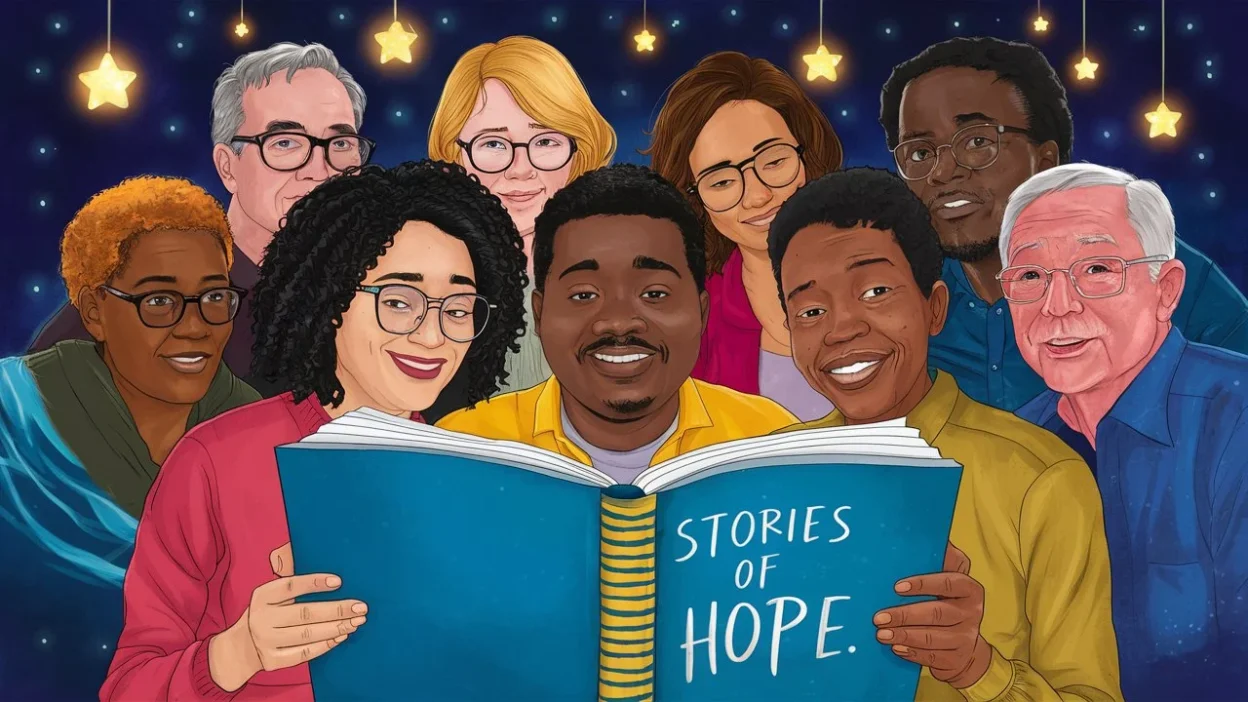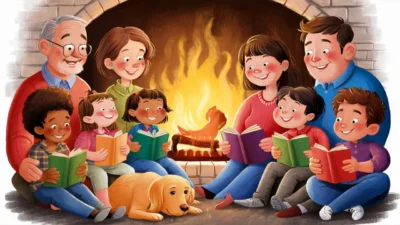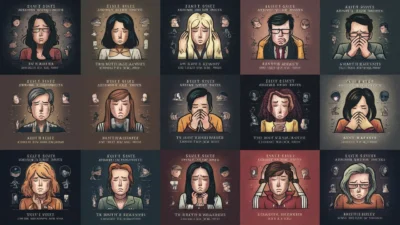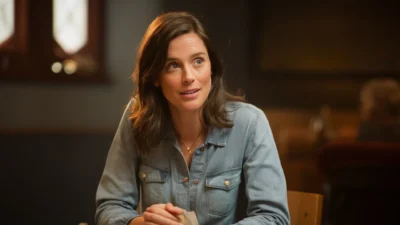Life tests everyone—some with heartbreak, some with loss, some with silence so deep it echoes. Yet, even in those darkest places, there are stories of hope that rise like sunlight after storms. These hot, trending, inspirational short stories are written for adults who need strength, motivation, and a reminder that good things still bloom in hard soil. In a world full of chaos, heartbreak, and exhaustion, these top emotional, life-changing, motivational true stories offer encouragement, faith, and new beginnings. Every story is human, real, raw, and filled with the kind of hope that refuses to die.
Story 1: The Last Chair in the Hospital
When Maya’s father entered the hospital, the doctors warned her gently: prepare yourself. His lungs were failing, his heart was weak, and hope seemed like a luxury no one dared to promise. For weeks, she sat by his bedside, holding his cold hand, whispering stories about the world waiting outside. Every breath he took was a battle, and every morning she arrived afraid it would be the last.
One night, when the rain tapped against the windows, Maya leaned close and said, “Dad, I’m not ready to lose you.” Her voice trembled. For the first time in days, his eyelids fluttered. He squeezed her fingers—soft, weak, but alive.
A new doctor arrived the next morning, young, determined, and full of stubborn optimism. He suggested a new treatment, barely available, experimental, uncertain. Maya agreed. Hope didn’t need guarantees; it only needed a chance.
Days passed. Tubes came out. Color returned to his face. His voice, once quiet like fading wind, grew stronger. Nurses began to smile when they entered the room. The hospital chair where Maya had slept for weeks sat empty. For the first time, she stood instead of waiting to collapse into it.
The day he walked outside, sunlight spilled over him like a blessing. His legs trembled, but he walked. Maya cried into his shoulder like she had been holding her breath for a lifetime.
Months later, he helped other patients, reminding them that hope was not foolish—just underestimated. The same hospital chair he once faced from a bed now held the weight of others leaning on faith.
Some people say miracles are rare. Maya disagrees. Sometimes miracles are simply people choosing to keep fighting, even when losing seems easier.
Moral: Hope is stronger than fear, as long as you refuse to let go of it.
Story 2: The Broken Painter
Elias was once known as the most passionate painter in his town—famous not for money, but for creating art that felt alive. Then everything collapsed. His wife passed away suddenly, and his hands, once steady like gentle waves, shook uncontrollably. He couldn’t hold a brush without dropping it. His world went silent. He stopped painting. He stopped speaking. The small studio that once smelled of oils and warm color became cold and dusty.
One evening, a little girl knocked on his door. She lived down the street, shy but determined. Holding a blank canvas, she said, “They told me you’re the best. Can you teach me to paint?” Elias almost shut the door, but her eyes reminded him of his wife—bright, curious, full of life. He didn’t answer, but he let her in.
Each day, she returned. She talked while he listened. She asked questions he never responded to. But she believed in him even when he didn’t believe in himself. One afternoon, she placed a paintbrush in his trembling hand. “Even if it shakes, it’s still your hand,” she whispered.
He dipped the brush into blue paint. A weak, uneven stroke appeared. He almost cried. It wasn’t perfect—but it was real.
Day after day, line by line, stroke by stroke, the tremble began to fade. His hands remembered what his heart tried to forget. The studio awakened. Color returned. The last thing he ever expected—life—began again.
One morning, the little girl found a finished painting hanging on his wall. A woman standing in sunlight, face lifted to the sky. His wife. The girl gasped. “You painted again!”
Elias smiled—small, soft, but real. “No,” he said. “We painted.”
He started teaching children for free, filling his empty studio with laughter instead of loneliness. His grief never disappeared, but hope grew around it like new flowers around an old stone.
Moral: Healing begins the moment you let someone reach for you in the dark.
Story 3: The Woman Who Planted Stars
Lena lived in a quiet town disguised by sadness. Every night, people locked their doors early. Dreams were small. Smiles were rare. But Lena believed light could change anything—even a whole town. She didn’t have money, power, or influence. She had seeds.
Not flower seeds—glow seeds. Tiny, shimmering plants that bloomed under moonlight. Most people thought they were useless. Lena didn’t care. She wanted beauty, magic, something that reminded tired people that dark didn’t always win.
Every night, while others slept, she planted. Roadsides. Abandoned yards. Spaces curled with weeds. Hands dirty, knees aching, she worked until dawn. No one noticed.
Until, one morning, a child screamed—not in fear, but joy. “The ground is sparkling!”
People gathered. The empty streets were glowing like fallen stars. Children touched the tiny flowers. Elders cried. For the first time in years, the streets felt alive.
The next night, Lena planted more. Soon others joined—a baker, a teacher, a lonely widow, a boy who had forgotten how to smile. Hope, once whispered, became contagious.
A journalist visited, writing a story called The Woman Who Planted Stars. It spread across the country. Visitors came. Businesses reopened. The forgotten town became famous—not for tragedy, but transformation.
One day, a young girl asked Lena, “Why did you do it? Did you know it would save us?”
Lena shook her head. “I didn’t plant for change. I planted for hope. Change came on its own.”
Years later, when Lena passed away, the town held a midnight ceremony. Every street glowed. Every seed bloomed. And the people understood—they would never return to darkness again.
Moral: A single act of hope can turn a silent world into a place of miracles.
Story 4: The Letter That Arrived Late
Adriana had spent ten years believing her brother died angry with her. Their last conversation was a fight—loud, painful, full of words that tasted like regret even as they were spoken. Then he left for military duty, and days later, the news arrived. He was gone. No goodbye. No chance to apologize. The guilt stayed like a stone in her chest.
She stopped celebrating her birthday. She stopped singing. She stopped dreaming. Her world became colorless, the kind of gray that settles into bones.
One winter afternoon, a stranger knocked at her door—a mailman with tired eyes and a yellowed envelope. “This has been in a storage unit for years,” he said. “They found it during cleanup.”
Her breath froze. It was her brother’s handwriting.
Hands shaking, she opened it. Her brother wrote the letter the night before he died. He apologized for the fight. He said he loved her. He said she was the strongest person he knew. And at the bottom: “If something happens to me, promise you won’t stop living. Promise you’ll be happy—because that will mean I’m still here.”
She dropped to her knees, crying—not the shattered kind, but the kind that releases. The kind that heals.
The next morning, Adriana baked a cake for the first time in years. She called friends. She stood in the sunlight and whispered, “I keep the promise.”
She didn’t forget him; she lived for him. Some nights she sat under the stars, reading his letter aloud, smiling at memories instead of drowning in grief. The world didn’t change overnight, but her heart did. Slowly, gently, like dawn stretching across sky.
And in her dreams, her brother finally smiled back.
Moral: Sometimes hope arrives late, but it always arrives when the heart is ready to heal.
Story 5: The Blind Runner
Kenan lost his vision at twenty-six. A rare illness stole the light from his eyes, slowly, cruelly. One day he was running marathons; the next, he couldn’t find his own front door. His world shrank. Friends disappeared. Even family treated him like he was fragile glass.
But his coach, Mr. Harlan, refused to let him quit life. One morning, he handed Kenan a rope. “You hold one end. I’ll hold the other. You’ll run with me.”
Kenan laughed bitterly. “I can’t even walk straight.”
“Then we’ll start crooked,” the coach said.
At first, it was chaos. Kenan tripped, fell, cursed, cried. People stared. Some whispered. But Mr. Harlan never let go of the rope. Step by step, Kenan’s feet remembered what his heart had forgotten—movement, rhythm, freedom.
They trained every morning. Rain. Ice. Sun. The world was dark, but Kenan ran like he could see everything.
One year later, he entered a marathon with his coach tethered to him. They ran as one. Crowds cheered. Some cried. Every mile was a war, but he had already lived through something worse—hopelessness.
Near the finish line, Kenan stumbled. His knees buckled. He wanted to give up. Then he heard a voice from the crowd: “He’s the blind runner! He can do it!”
Hope lit through him like fire. He stood. He ran. He finished.
When the medal was placed around his neck, he whispered, “I didn’t win because I can see. I won because I believed.”
Later, he began coaching others with disabilities—proving that broken doesn’t mean finished, and darkness can’t stop a heart that keeps running.
Moral: Hope is not about what you see—it’s about what you refuse to stop believing.
Story 6: The Man Who Rebuilt Sundays
After his wife died, Mr. Delgado stopped cooking. She loved Sunday dinners—big pots of soup, freshly baked bread, laughter loud enough to shake the windows. After she was gone, Sundays turned silent. He ate crackers. Cold cereal. Sometimes nothing.
One evening, a boy knocked at his door. “My mom said you used to make the best soup. Could you… teach me?” Mr. Delgado almost closed the door, but the boy looked so sincere that he paused.
He invited him in. The kitchen felt empty, but the boy filled it with questions and stories. Together, they cut vegetables, stirred broth, and waited for flavors to bloom. When the soup finished, the boy tasted it and smiled. “It tastes like home.”
The next Sunday, he came again—bringing his sister. Then two more neighborhood kids. The quiet house filled with footsteps and chatter. Mr. Delgado taught them recipes, manners, patience, and kindness. Word spread. Soon, parents joined. Grandparents too. What once was grief became community.
He hung photos of every Sunday gathering on his kitchen wall. Where there had been silence, now there was joy. One afternoon, a woman told him, “You saved this neighborhood. You gave our children a place to belong.”
He shook his head. “No. They saved me.”
And every Sunday, when the soup simmered and laughter filled the air, he knew his wife was smiling somewhere.
Moral: The deepest loneliness can be healed by giving others a place to feel loved.
Story 7: The Homeless Man with a Library
Lucas had nothing—no house, no job, no family. But he had books. Hundreds of them, collected from trash bins, abandoned boxes, forgotten libraries. People thought he was strange. A homeless man guarding novels like treasure. Every night, he stacked them neatly under the old bridge where he slept.
One evening, a little girl approached him. She was crying. Her father was shouting into a phone, too busy to notice her trembling. Lucas offered her a book—The Secret Garden. She wiped her eyes and sat beside him, reading until her father dragged her away. The next day, she came back with two friends. Then more children began visiting. Lucas read stories aloud, changing voices, making them laugh.
Parents noticed. Instead of chasing him away, they watched their children run home eager to share stories. Soon, a teacher approached Lucas. “If I bring supplies, will you help us read to more kids?”
Lucas agreed. They made a small library under the bridge—plastic shelves, old carpet, fairy lights powered by a donated battery. Children called it The Story Tunnel.
Someone took a picture. It spread online. Donations came from everywhere—books, food, clothes, volunteers. A nonprofit organization offered Lucas a job: Community Reading Coach.
He accepted—but insisted the library stay under the bridge. “Hope should exist where people least expect it,” he said.
Years later, the Story Tunnel became a registered literacy program, helping struggling children fall in love with reading. Lucas never became wealthy, but he became something more important: a man who gave hope to kids who needed escape, imagination, and safety.
Moral: You don’t need riches to change lives—just a heart willing to give.
Story 8: The Mother Who Waited
Sara waited outside the rehab center every Sunday, holding the same paper bag of homemade food. Her son, Ahmed, was inside—angry, ashamed, broken by addiction. He hadn’t spoken to her in months. But she waited. Rain, heat, snow—she sat on the bench and waited, whispering prayers into the wind.
The staff told her, “He refuses to see you.” Still, she came.
Other families stopped visiting. Some gave up entirely. But hope is stubborn. And a mother’s love is the most stubborn of all.
One Sunday, a counselor approached her. “He had a bad week. He says you should stop wasting your time.”
Sara smiled gently. “As long as he breathes, my time is never wasted.”
Weeks passed. Then months. She grew older, thinner, but never weaker. The nurses started sitting with her during breaks. Strangers brought her coffee. Her hope became contagious.
One cold evening, long after visiting hours ended, footsteps approached. Ahmed stood there—thin, pale, eyes heavy. “Mom,” he whispered. She didn’t cry or collapse. She simply opened her arms. He fell into them, shaking.
“I’m sorry,” he choked.
“You’re home,” she said.
He didn’t heal overnight. Recovery is a road with sharp edges. But he tried—because someone believed he could. He finished treatment, found work, rebuilt his life piece by piece. And every Sunday, they ate together on the same bench where she waited for him.
One day, he told her, “You didn’t save me. Your hope did.”
Moral: The world breaks people—but unconditional love can build them again.
Story 9: The Teacher Who Stayed
Ms. Amina taught at a failing school where students came hungry, angry, and tired. Most teachers left after one year. The building was crumbling, supplies were scarce, and the city called it “hopeless.”
But Ms. Amina didn’t leave.
She spent her own money on notebooks, pencils, snacks. She learned her students’ stories—parents lost, siblings sick, families struggling to survive. She realized they needed more than lessons. They needed belief.
So she changed the rules: every morning, students wrote one sentence beginning with “One day I will…” At first, the sentences were small: “One day I will get a job.” Then they grew. “One day I will become a nurse.” “One day I will build my own house.” Hope expanded.
She turned a classroom closet into a mini library. She taught them poetry to heal anger, science to grow curiosity, math to build confidence. She listened—really listened—to every voice.
Years passed. The school improved. Test scores rose. Graduates returned, telling her, “You saved my life.” Some became teachers, doctors, engineers, artists. One became a principal—and hired Ms. Amina to train new educators.
One afternoon, during a community ceremony, the mayor said, “She didn’t just teach students—she rebuilt a neighborhood.”
But Ms. Amina shook her head. “They rebuilt themselves. I just refused to leave.”
Moral: Hope grows wherever someone chooses to stay and believe.
Story 10: The Window of Wishes
In an old apartment building lived Mr. Faris, a lonely widower. His window overlooked a busy street where people rushed without noticing each other. To feel less invisible, he started writing small hopeful notes—“You matter.” “Today will be better.” “Someone is proud of you.”—and taped them to his window.
At first, no one cared. But one morning, a teenager paused, read a note, and smiled. The next day, two people stopped. By the end of the week, dozens gathered daily.
So Mr. Faris wrote more.
People began leaving their own messages taped beneath his: dreams, fears, gratitude, apologies. The window became a wall of human hearts speaking to each other. Strangers encouraged strangers. Some wrote, “I didn’t give up today because of this.”
One stormy night, Mr. Faris fell ill and was rushed to the hospital. He worried the window would go dark and the hope would fade.
But when he returned home weeks later, he gasped. The entire building—every floor—had windows filled with messages. Colorful papers, drawings, poems, prayers. The street was brighter than ever.
His neighbors had written one giant note across the bricks:
“You started this. Thank you for giving us hope.”
Tears filled his eyes. He never expected to matter. Yet he changed an entire city without leaving his window.
Moral: Even the smallest act of hope can create a world someone desperately needs.
✅ CONCLUSION
In a world filled with exhaustion and uncertainty, these stories of hope remind us that miracles aren’t always loud. Sometimes they look like a stubborn mother waiting on a bench, a blind man running toward his dream, a forgotten town glowing with tiny flowers, or a simple handwritten note. Hope may bend, tremble, disappear, or arrive late—but it never dies if someone keeps believing. These motivational true stories, inspirational short stories, and positive stories for adults prove the same truth: darkness cannot win against a heart that refuses to surrender.




